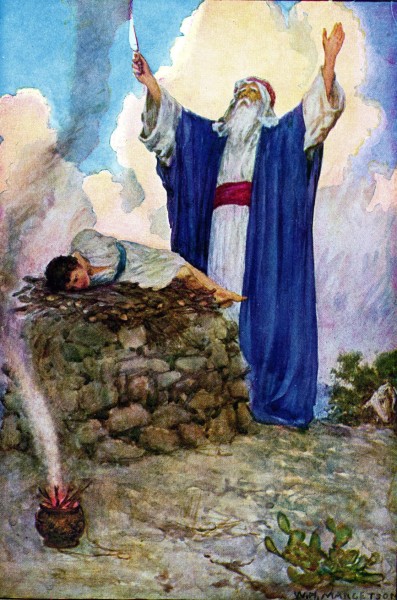Genesis 22:1-14
Lectionary Reading Proper 8 Year A

God tested Abraham. He said to him, “Abraham!” And he said, “Here I am.” He said, “Take your son, your only son Isaac, whom you love, and go to the land of Moriah, and offer him there as a burnt offering on one of the mountains that I shall show you.” So Abraham rose early in the morning, saddled his donkey, and took two of his young men with him, and his son Isaac; he cut the wood for the burnt offering, and set out and went to the place in the distance that God had shown him. On the third day Abraham looked up and saw the place far away. Then Abraham said to his young men, “Stay here with the donkey; the boy and I will go over there; we will worship, and then we will come back to you.” Abraham took the wood of the burnt offering and laid it on his son Isaac, and he himself carried the fire and the knife. So the two of them walked on together. Isaac said to his father Abraham, “Father!” And he said, “Here I am, my son.” He said, “The fire and the wood are here, but where is the lamb for a burnt offering?” Abraham said, “God himself will provide the lamb for a burnt offering, my son.” So the two of them walked on together.
When they came to the place that God had shown him, Abraham built an altar there and laid the wood in order. He bound his son Isaac, and laid him on the altar, on top of the wood. Then Abraham reached out his hand and took the knife to kill his son. But the angel of the Lord called to him from heaven, and said, “Abraham, Abraham!” And he said, “Here I am.” He said, “Do not lay your hand on the boy or do anything to him; for now I know that you fear God, since you have not withheld your son, your only son, from me.” And Abraham looked up and saw a ram, caught in a thicket by its horns. Abraham went and took the ram and offered it up as a burnt offering instead of his son. So Abraham called that place “The Lord will provide”; as it is said to this day, “On the mount of the Lord it shall be provided.”
That very first sentence: “God tested Abraham.” I don’t like it. I don’t like to think of God as a God who would tests us. I don’t like it because I believe that God is a God who helps us when we’re going through trials. But that first sentence makes it clear that God causes the trials. When I read something that doesn’t fit what I believe God is like, I have to wrestle with it. I’ve learned not to cling too tightly to who I want God to be, it often gets pried from my theologically arthritic grip. I don’t want to be like Job’s friends. I don’t want to look at what is happening through the lens of who I believe God is. I have to look at who God is through the lens of what is happening and what all of scripture tells us. Job’s friends could only allow for a narrow explanation of his suffering because they never took into consideration that their understanding of who God is was wrong. The book of Job starts out giving us a behind the scenes look at the story. God is allowing Job’s faith to be tested. The friends’ theology didn’t have room for a god who does that and all they could come up with was that his suffering was the result of his sin. Job wasn’t the problem, their understanding of God was. His friends were well intentioned and had a vast knowledge of God but in the end, as good as their theology sounded, they were wrong and God let them know about it. Theirs was a theology void of love and compassion. Instead of seeing God as merciful, loving and full of compassion, they saw Him as transactional. And under the circumstances, God did not seem very loving and compassionate towards Job. God is the great “I am”. Whatever my situation is, it doesn’t define who God is. The faith that God asks us to have is that we hold on to who He is. We hold on to believing that He is love, mercy, goodness, kindness, compassion, slow to anger no matter what the circumstances of our life are.
Tim Mackie and Jon Collins discuss the idea of God testing us. Their take is that trials and tests are an opportunity.We can see them as opportunities because God has our best interest at heart. Abraham is given an opportunity. Actually he was given many opportunities and sometimes he didn’t do so well with them. He and Sarah took matters into their own hands instead of waiting on God’s promise for a son. Adam and Eve were tested when they were told not to eat of the fruit from the tree of the knowledge of good and evil. Daniel and his companions were tested. Esther was tested. Jesus was tested. All of these tests were opportunities to do something great for God’s kingdom.
12 Blessed is a man who perseveres under trial; for once he has been approved, he will receive the crown of life which the Lord has promised to those who love Him. 13 No one is to say when he is tempted, “I am being tempted by God”; for God cannot be tempted by evil, and He Himself does not tempt anyone. 14 But each one is tempted when he is carried away and enticed by his own lust. 15 Then when lust has conceived, it gives birth to sin; and sin, when it has run its course, brings forth death. James 1:12-15
The same greek root lies behind the word “trials” and the word “tempted”. The difference implied by the text is that one comes from the outside and the other is generated within. I think we all undergo many trials in life. If Tim and Jon are accurate in their understanding that trials are opportunities, then perhaps there is a steady flow of opportunities that never ends from the time we wake up to the time we go to sleep.
- praying and meditating on scripture vs. scrolling thru our SM
- being courteous and patient in traffic
- not cheating on our taxes
- including someone who is feeling left out
- our speech with one another
- helping others
- spending our money wisely
- eating and exercising well (caring for the temple)
- returning our shopping cart
- cleaning up after our dog
The list of small things is endless. Though these do not seemingly require mountain-moving faith, but they are easy to brush off as insignificant. Maybe they only require mustard seed faith😏(Matthew 17:20-21) I think these test our character. They are micro stress tests. They test how we live out our faith. These come from outside ourselves and test our inner-selves. I wonder that if I am not faithful with all the small things, what makes me think I have in any way prepared myself for bigger things. (Luke 16:10) I see so many people proclaiming Jeremiah 29:11 in the belief that God has great plans for them. And in somewhat of a fitting way here, that verse applies. God is speaking to the Israelites as a nation not to us as individuals. And he is calling them to settle in the land that they have been exiled to. God’s plans for them require their faithfulness. It is up to them to build their life in a foreign country. That is not what they want. He is telling them to settle in, be faithful to him and He will bless them where they are. Perhaps the lesson fur us as christians to learn is to not look for God to be doing some great thing in our lives or for us to expect God to bless our great ambitions but rather to live as Christ every day. Pray and meditate everyday. Love our neighbor everyday. Look to God for our daily bread. Return our shopping carts. Clean up after our dogs. Sweep our side of the street. Stay faithful in all the unsexy ways that we encounter Christ everyday knowing that it is enough that God is pleased with how we are loving our neighbor at that is not insignificant. Perhaps all the small things grow our faith muscles. No one goes to the gym one time and becomes strong and fit. Exercise is a lifestyle and consistently working out produces the results. Consistently praying and meditating and being courteous and holding our tongue is the flex our faith muscles need to grow preparing us for bigger flexes.
42 And whoever gives one of these little ones just a cup of cold water to drink in the name of a disciple, truly I say to you, he shall by no means lose his reward.” Matthew 10:42
Whatever act of loving our neighbor we do in faith, no matter how small it may seem, does not go unnoticed! What is our reward? I don’t really know. But I have to infer that if it is something that we can’t lose, that it is something eternal, something that cannot fade or rust, be stolen or lost. It is perhaps the ever so slow transformation of becoming like Jesus. When we had the chance to do, even the smallest act of love, it transforms us in a way that cannot be undone. And that is a great reward.
